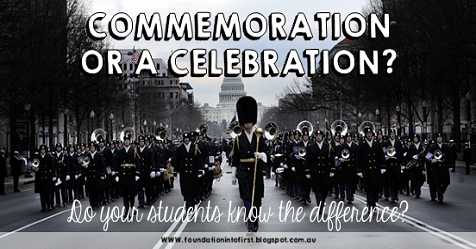The Australian Curriculum (ACARA) Knowledge and Understanding for History Year 3 (HASS) states that students should explore both celebrations and commemorations in places around the world.
However, to do this they first need to understand the difference between a commemoration and a celebration. Have you ever stopped to think about this yourself?
For example, ANZAC Day and Remembrance Day are very clearly a commemoration and NOT a celebration. In Australia we hold commemorative assemblies, lay wreaths and contemplate and remember those that have died. We do not 'celebrate' their deaths, we commemorate them.
Birthdays, on the other hand, are quite clearly a celebration (although in a sense we are commemorating the birth of somebody, it is traditionally known as a celebration). During celebrations we eat special food (birthday cake), sing special songs (Happy Birthday), give presents (birthday presents) and play games. Once you start to develop a strong understanding with students about what a celebration is, it then becomes clearer to see what is NOT a celebration (such as ANZAC Day or Remembrance Day). You may, however, have students in your class who do not celebrate birthdays due to religious reasons. It's always worth discussing this with your students well in advance of any 'birthday' activities.
Interesting fact: did you know that Remembrance Day in America is known as a celebration of war veterans rather than a commemoration of the end of World War 1?
So ANZAC Day, Remembrance Day are clearly commemorations and Birthdays are traditionally a celebration. What about other special days?
Diwali is a great example of a celebration and ask any child in your class who celebrates this special day and they will be so excited to tell you all about it. I always ask who celebrates Diwali and then ask them to come to the board so we can explore if this special day is a celebration or a commemoration. Make sure you have brainstormed the two terms and found the dictionary definition before starting. Do you eat special food? Do you sing special songs? Do you give gifts? Do you play special games or perform special dances? Let your students tell you all about their special day.
Saint Patrick's Day is another special celebration for anybody of Irish heritage. In Ireland it is a public holiday and celebrated as the national day but elsewhere around the world it is a chance to celebrate all things Irish. If you have any students with Irish heritage you can discuss this with them as well.
Students LOVE talking about their special day and it makes a fantastic 'show and tell' activity throughout the year.
Once you have established what the two terms 'celebration' and 'commemoration' mean you can do a sorting activity (you can find the one pictured below available here) and when completed, ask students to brainstorm other commemorations and celebrations. It's a fantastic open-ended task to get students to find out the what, when and why of seasonal celebrations around the world or in their community.











No comments
Note: only a member of this blog may post a comment.